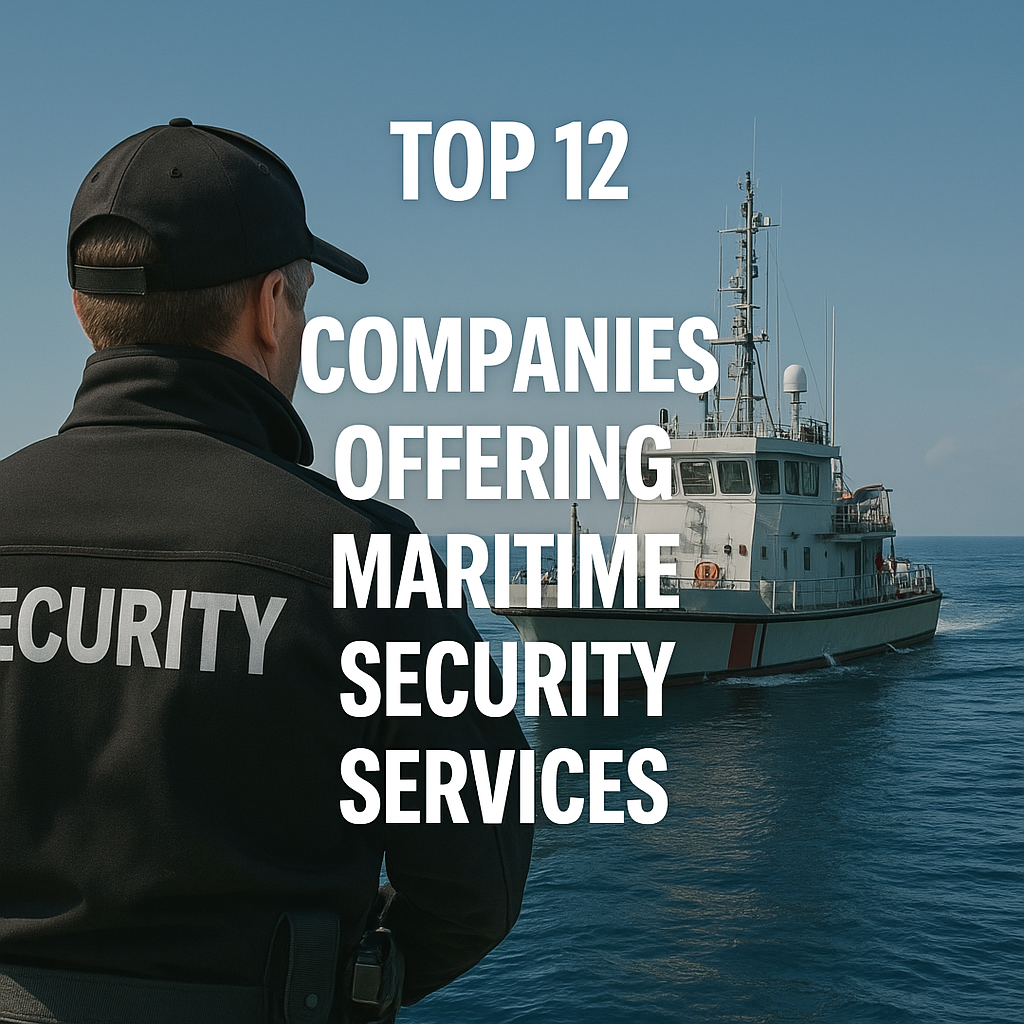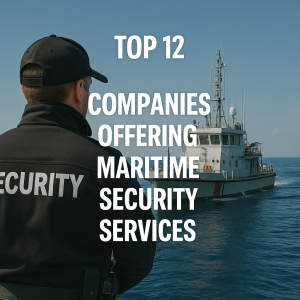Explore the top 12 maritime security companies safeguarding international waters. Learn how they protect shipping lanes, deter piracy, and support global trade through advanced technologies and tactical expertise.
Why Maritime Security Services Matter in Modern Shipping Operations
Every day, over 90% of the world’s trade is carried by sea, making maritime security a critical pillar of global commerce and geopolitics. From piracy in the Gulf of Guinea to geopolitical tensions in the Red Sea and cyber threats targeting smart vessels, the risks to ships and crew are real and evolving.
The International Maritime Bureau (IMB) recorded over 120 piracy incidents globally in 2023 alone, with hotspots in West Africa, Southeast Asia, and the Indian Ocean. These risks not only threaten seafarers’ lives but also delay cargo deliveries, inflate insurance premiums, and destabilize economies.
Maritime security companies help fill this gap—offering physical protection, onboard armed or unarmed guards, vessel tracking, intelligence services, crisis response, and cybersecurity. With increasing automation and global instability, the need for professional maritime security has never been greater.
Top 12 Companies Offering Maritime Security Services
1. Control Risks
Headquarters: London, UK
Specialties: Risk intelligence, armed escorts, crisis response
Control Risks is a global consultancy known for combining geopolitical analysis with maritime operations. It works closely with ship operators, charterers, and offshore infrastructure clients, offering tailored risk mitigation strategies and deploying vetted security teams in high-risk areas.
2. Ambrey
Headquarters: Herefordshire, UK
Specialties: Armed guards, convoy coordination, compliance
Ambrey is the world’s largest privately-owned maritime security firm. With over 15,000 vessel protection missions completed, they offer full-spectrum solutions, including embarkation teams, armed escorts, and compliance with ISO 28007 standards. Their presence is especially strong in the Gulf of Aden and West Africa.
3. GardaWorld
Headquarters: Montreal, Canada
Specialties: Maritime logistics protection, intelligence, personnel security
Though known for land-based operations, GardaWorld’s maritime division plays a pivotal role in cargo vessel security, especially in East Africa and the Middle East. Their integrated risk management services include tracking, armed response, and emergency evacuation.
4. Hart Security
Headquarters: Cyprus
Specialties: Government-grade maritime security, counter-piracy, training
Founded by former UK Special Forces, Hart Security has been instrumental in defending merchant vessels in high-threat zones. They are known for using highly trained teams and delivering security training compliant with IMO and BMP5 (Best Management Practices) guidelines.
5. Olive Group (A Constellis Company)
Headquarters: Dubai, UAE
Specialties: Vessel security, cyber resilience, corporate risk
Olive Group provides maritime risk solutions backed by sophisticated intelligence tools. Their global operations serve oil tankers, bulk carriers, and port authorities. Since becoming part of Constellis, their global reach has expanded across the Middle East and Africa.
6. EOS Risk Group
Headquarters: UK
Specialties: Maritime security audits, vessel protection, insurance advisory
EOS Risk Group is ISO 28007 certified and offers embedded security teams for long-haul voyages. They also work with insurers like Lloyd’s to manage risk premiums and incident response.
7. Securewest International
Headquarters: Devon, UK
Specialties: Maritime tracking, armed/unarmed guards, ship hardening
Securewest has provided maritime security since the 1980s and is a recognized authority on BMP5 implementation. Their Maritime Assistance Centre provides 24/7 global situational awareness, and their vessel protection teams deploy globally.
8. MAST (Maritime Asset Security and Training)
Headquarters: Essex, UK
Specialties: Security consultancy, port security, training services
MAST offers comprehensive risk intelligence, port vulnerability assessments, and maritime training. Their teams are known for professionalism and adaptability in fast-changing threat environments.
9. Ocean Shield
Headquarters: UAE
Specialties: Armed guards, high-risk escort convoys, shipping protection
Operating under UAE jurisdiction, Ocean Shield protects vessels transiting the Red Sea, Indian Ocean, and Horn of Africa. Their onboard teams are equipped to respond to piracy, smuggling, and sabotage attempts.
10. Drum Cussac
Headquarters: Bournemouth, UK
Specialties: Maritime intelligence, risk mitigation, personnel evacuation
Drum Cussac delivers end-to-end services including global maritime intelligence briefings, ship protection, and emergency extraction. They are often employed by shipping corporations operating in volatile regions like the Gulf of Guinea.
11. MARITIME GUARDIAN LTD.
Headquarters: Greece
Specialties: Armed vessel protection, anti-piracy patrols, port security
This company specializes in Mediterranean and Suez transits. Working with insurers and maritime law firms, Maritime Guardian ensures both compliance and combat-readiness.
12. Diaplous Group
Headquarters: Cyprus
Specialties: Security escort vessels (SEVs), port facility assessments
Diaplous has grown rapidly since 2010, offering innovative Security Escort Vessels (SEVs) and is trusted by major oil and gas shipping clients. They also collaborate with governments to advise on maritime security infrastructure.
–
Key Technologies & Developments in Maritime Security
Smart Surveillance and Satellite Tracking
Companies now use real-time satellite tracking from providers like Inmarsat and MarineTraffic to monitor vessel movements and detect anomalies.
Security Escort Vessels (SEVs)
Escort vessels, such as those deployed by Diaplous Group and Ambrey, provide perimeter protection in known piracy zones, a crucial development since the rise of drone-based maritime threats.
Cybersecurity Integration
With smart ships and automated navigation systems, maritime security firms increasingly collaborate with cybersecurity specialists to safeguard against GPS spoofing, malware, and data breaches.
AI-Based Risk Forecasting
Firms like Control Risks and EOS Risk use AI-driven platforms that analyze regional instability, shipping lanes, and piracy reports to recommend optimal shipping routes and security measures.
–
Challenges and Solutions
Legal Complexities and Flag-State Variability
Using armed guards or SEVs often involves navigating complex international laws (UNCLOS, ISPS Code). Companies must ensure compliance with both flag-state and port-state regulations.
Solution: ISO 28007 compliance, which certifies that companies are following internationally accepted standards for private maritime security.
Escalating Piracy Hotspots
From the Horn of Africa to the Gulf of Guinea, piracy remains fluid. Attacks may shift in location and intensity depending on military presence, weather, or economic conditions.
Solution: Real-time threat mapping and flexible deployment models offered by firms like Securewest and MAST.
Rising Cyber Threats
As vessel control systems become digitized, hackers can theoretically disrupt navigation or cargo systems, creating both financial and safety risks.
Solution: Integrated cyber-physical protection, including encrypted satellite communication and remote monitoring.
–
Real-World Example: Secure Transit Through the Bab el-Mandeb Strait
In 2023, a chemical tanker flagged under Malta contracted Ambrey to secure its passage through the Bab el-Mandeb Strait—one of the most dangerous chokepoints due to Yemen’s ongoing instability. Ambrey deployed a four-person armed team trained in maritime engagement protocols and equipped the vessel with non-lethal deterrents like LRADs (long-range acoustic devices).
Thanks to satellite tracking, coordination with a security escort vessel, and real-time intelligence, the tanker completed its journey without incident. This case showcases the layered approach used by modern maritime security providers.
FAQ: Maritime Security Services
1. What does a maritime security company do?
They offer services ranging from onboard protection (armed/unarmed guards), convoy escorting, satellite tracking, piracy deterrence, port security, and maritime cyber defense.
2. Are private maritime security companies legal?
Yes, when operating within international law frameworks such as UNCLOS and in compliance with flag-state/port-state regulations and ISO 28007.
3. How much does maritime security cost for a vessel transit?
Costs vary depending on risk level, duration, and region. A single armed escort team may range from $15,000–$30,000 for a 7–10 day transit.
4. What is the ISO 28007 standard?
It certifies private maritime security companies for providing armed guards on commercial vessels, ensuring safety, legality, and professionalism.
5. What are BMP5 guidelines?
Best Management Practices Version 5 (BMP5) is a set of voluntary industry guidelines developed by the shipping industry to deter piracy.
6. Can maritime security companies assist with evacuations?
Yes. Companies like Drum Cussac and GardaWorld offer emergency evacuation services during geopolitical crises or natural disasters.
7. How are maritime security threats evolving?
They are expanding beyond piracy to include cyberattacks, drone surveillance, and geopolitical disruptions in strategic waterways.
Conclusion: Protecting the Lifeblood of Global Trade
As global shipping becomes increasingly sophisticated—and vulnerable—the role of maritime security companies grows ever more vital. These top 12 firms aren’t just offering physical protection; they’re building multi-layered systems of intelligence, deterrence, and compliance to keep global commerce flowing safely.
Whether you’re a shipping executive, port authority, cadet, or researcher, understanding the modern maritime security landscape is key to navigating today’s high-stakes ocean economy. Choose partners that combine experience, legality, and technological prowess.
References
-
International Maritime Bureau (IMB). (2024). Piracy and Armed Robbery Report. https://www.icc-ccs.org
-
IMO. (2023). Guidelines on Maritime Security and the ISPS Code. https://www.imo.org
-
ISO. (2020). ISO 28007-1:2015 Guidelines for PMSCs. https://www.iso.org
-
BIMCO. (2023). Best Management Practices to Deter Piracy (BMP5). https://www.bimco.org
-
Lloyd’s List Intelligence. (2024). Maritime Security Reports. https://lloydslist.maritimeintelligence.informa.com
-
Ambrey. (2024). Case Studies and Operational Reports. https://www.ambrey.com
-
MAST. (2024). Maritime Security Solutions. https://mast-security.com


